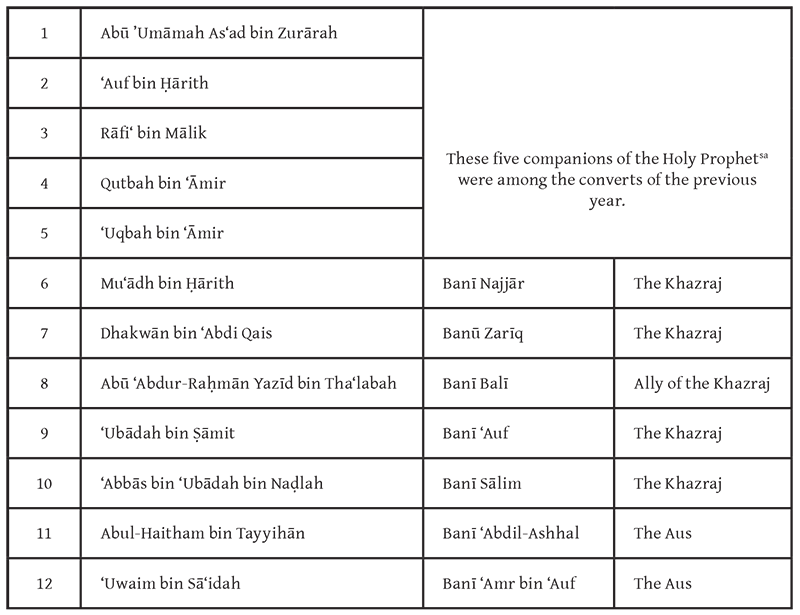
This year was spent in Makkah by the Holy Prophetsa in concern and anticipation for the people of Yathrib with regards to their physical means. The Holy Prophetsa would often think, ‘Let us see the outcome of these six converts, and if there are any signs of success in Yathrib or not?’ For the Muslims as well, with respect to physical means, this era was one of concern and anticipation. They saw that the leaders of Makkah and the chieftains of Ṭā’if had sternly rejected the mission of the Holy Prophetsa, and one by one, the various tribes of Arabia had also put a stamp on their condemnation. A ray of hope began to shine in Madīnah, but who could figure that this ray of light could stand before storms of affliction and torture, against the cyclones of hardship? On the other hand, the cruelties of the Makkans were growing day by day, for they understood well that now was the time to erase Islām. But even in this delicate era (such as a more vulnerable era had not befallen Islām), the Holy Prophetsa and his companions stood in their place like a firm mountain. At times, the determination and steadfastness of the Holy Prophetsa would even put his enemies to astonishment, after all, what kind of inner-strength does this man possess? For nothing seems to move him from his place. Rather, in that era, the words of the Holy Prophetsa especially possessed a kind of power and awe, and in these fierce storms, the Holy Prophetsa would become even more audacious. On one side, if this sight astonished the Quraish, on the other, it also made their hearts tremble. With regards to these days, Sir William Muir writes:
“Moḥammad thus holding his people at bay; waiting in the still expectation of victory; to outward appearance defenceless, and with his little band as it were in the lion’s mouth; yet trusting in His Almighty power whose Messenger he believed himself to be, resolute and unmoved; presents a spectacle of sublimity paralleled only by such scenes in the Sacred Records as that of the prophet of Israel when he complained to his master, ‘I, even I only, am left.’ Nay, the spectacle is in one point of view even more amazing…It is this which brings if possible into still bolder prominence the marvellous self-possession and enthusiasm which sustained Moḥammad on his course. ‘Say unto the Unbelievers.’ Such was the reiterated message from on high, ‘Work ye in your place. Wait in expectation; WE too in expectancy are waiting.’”1
Therefore, this was a vulnerable era for Islām, in that there was no expectancy from the Makkans. But a ray of hope was developing in Madīnah, and the Holy Prophetsa keenly had his eyes set in that direction. Would Madīnah also reject the Holy Prophetsa like Makkah and Ṭā’if, or did it hold a different destiny? Therefore, when the occasion of Ḥajj came the Holy Prophetsa very avidly left his home and reached ‘Aqabah, near Minā, and looked here and there. Suddenly, the Holy Prophetsa noticed a small group of the people of Yathrib, who immediately recognized the Holy Prophetsa. They came forward and met the Holy Prophetsa with extreme love and sincerity. This time there were twelve people, among whom five were converts of the previous year and seven were new. They belonged to both the Aus and the Khazraj.
There names are as follows:

The Holy Prophetsa met these people separately in a valley. They informed him as to the state of affairs in Yathrib and this time they all took Bai‘at at his hand. This Bai‘at served as a foundation stone for Islām in Madīnah. Since Jihād of the sword had not yet been ordained, the Holy Prophetsa took Bai‘at only in the words in which he would take Bai‘at from the women after Jihād (by the sword) was obligated. In other words, ‘We shall believe in one God, shall not associate partners with God, shall not steal, shall not commit adultery or fornication, shall abstain from murder, shall not defame anyone, and shall obey you [the Holy Prophetsa] in everything good.’ After Bai‘at, the Holy Prophetsa said:
“If you remain true to this pledge in honesty and steadfastness then you shall receive paradise. But if you show weakness then your matter is with Allāh the Exalted, for He shall do what He wills.”
In history, this Bai‘at is renowned as ‘The First Bai‘at at ‘Aqabah’, because the place where this Bai‘at was taken was called ‘Aqabah, which is situated between Makkah and Minā. The literal meaning of ‘Aqabah is an elevated mountainous pass.
Whilst departing from Makkah, these twelve new Muslim converts requested, “Please send an Islāmic tutor with us, who can teach us Islām and can preach Islām to our idolatrous brothers as well.” The Holy Prophetsa sent Muṣ‘ab bin ‘Umairra, a very devout young man from the ‘Abdud-Dār tribe along with them. An Islāmic preacher was referred to as a Qārī or Muqrī2 in those days, because the majority of their work was to recite the Holy Qur’ān, as this was the best method of preaching. As such, Muṣ‘abra was also renowned by the name Muqrī in Yathrib.3
1 Life of ‘Mahomet’, By Sir William Muir, p. 126, Reprint of the 1894 Ed., Published by Voice of India New Delhi (Publishers)
2 Reader or Elocutionist (Publishers)
3 * As-Sīratun-Nabawiyyah, By Abū Muḥammad ‘Abdul-Malik bin Hishām, p. 310, Al-‘Aqabatil-Ūlū wa Muṣ‘ab bin ‘Umair, Dārul-Kutubil-‘Ilmiyyah, Beirut, Lebanon, First Edition (2001)
* Tārīkhuṭ-Ṭabarī, By Abū Ja‘far Muḥammad bin Al-Jarīr Ṭabarī, Volume 2, p. 247, Bābu Dhikril-Khabri ‘ammā kāna min Amri Nabiyyillāhisa ‘inda Ibtidā’illāhi Ta‘ālā......, Dārul-Fikr, Beirut, Lebanon, Second Edition (2002)